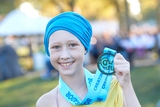Video Tour: Cancer Immunotherapy
Stephan Grupp, MD, PhD: Immunotherapy is a revolution in cancer care. Welcome to Children's Hospital of Philadelphia and the Cell Therapy Program.
This all began five years ago when we treated the first patient with effective cellular therapy for relapsed leukemia. Since then, we've treated many children —more than any other hospital.
Immunotherapy is a whole different way to treat cancer. What's amazing about this treatment is that it can even control large amounts of cancer in patients whose disease is not responding to any other therapy. Here in the lab, we have a number of researchers and technicians who are working to develop some of the new cell therapies that hopefully will be working in the same way as the cell therapy that we've developed for leukemia.
There are a lot of people involved in making this work. There are docs, but there are nurses, nurse practitioners, social workers, financial counselors, all sorts of folks who are here to help you make the transition to access this therapy at CHOP and to help in any way that we can.
Now, we're gonna show you what's gonna happen during your visit here at CHOP and how this process works.
Claire White, BSN, RN: You just met Dr. Grupp. His lab's over here in the Colket Building. Your first appointment is going to be in the Buerger Center. Let's head that way.
Your first stop will be here on the third floor of the Buerger Center. You'll start your day in an exam room. You'll have a physical exam, and we'll review your medical history. We'll collect labs and talk with you about the plan. Then we'll take you on a tour, showing you many of the same places that you'll see in this video.
The next step happens across the street. Let's take a look.
Stephanie Fooks-Parker, MSW, LSW: Next, you'll be in CHOP's main building. Our team of interventional radiologists will place a central line for apheresis. The waiting room for radiology is right here. You'll come back here after we've collected your T cells to have your line removed. Our radiology team is one of the best in the nation. They'll help you and your child through this process.
[Bolena]: The first step is called apheresis. It's hard to pronounce. I'm Bolena and I came here from Mexico for a T-cell therapy. This is the machine that collects your T cells. I was a little scared, but everybody at CHOP made me feel safe.
Your temporary line has two tubes. Blood is pulled out through one tube; it runs through the machine, then it goes back into your body with the other tube. It didn't hurt at all. It took a few hours, and it's annoying because you can't leave the bed. So bring stuff to do.
My parents and grandma stay with me. I read and watched a movie. You can bring drinks and food if you want to. When you're done, this machine will have a whole bag of your T cells. They will be carried to a lab and stored in huge freezers. Now, we will explain how immunotherapy works.
My own cells learn how to attack my cancer.
Shannon Maude, MD, PhD: We turn your T cells into super cells that can find and destroy cancer cells. I'm going to explain how that happens. Let's take a look.
T cells, a type of white blood cell are designed to kill disease cells. But cancerous B cells often look like your own normal healthy cells, so T cells don't go after them. We're learning how to change that. We collect millions of T cells from the patient. Then we reprogram them in a lab so they can now identify the B cells and grab onto a substance that is found only on the surface of B cells.
When we put the reprogrammed T cells back into the patient, they flow throughout the body and begin locating cancerous B cells. As the reprogrammed T cells attach to and destroy the rapidly dividing cancerous B cells, they also multiply in the body and they can remain in the body long after to continue fighting any lingering cancerous B cells.
The actual infusion of your reprogrammed T cells takes place here in the Day Hospital, on the third floor of the Buerger Center. The infusion is simple. An injection of the cells into your central line. It only takes a few minute. The infusion typically happens during another longer visit to CHOP. Let's see everything that happens during that visit.
During those weeks, you might remain outpatient or you may need to stay in the Hospital for some of the time.
Colleen Callahan, RN, MSN, CRNP: The Children's Hospital of Philadelphia has a comprehensive pediatric oncology unit staffed with experts and caring for children with cancer. During and after the actual immunotherapy infusion, we will closely monitor you for side effects. If you develop a fever, we use standard fever management, and you will be admitted here to our oncology unit. Some children develop more serious side effects. They require transfer to our pediatric intensive care unit on the seventh floor.
Our PICU staff is especially equipped in managing serious side effects. Since our cancer immunotherapy team developed the care plans here, they’re now used worldwide. These are world-class resources that we have available here at CHOP to help support you through every step of the immunotherapy process.
Bolena: Me and my family are so glad we could take this tour with you. CHOP is here to help you. I come back every six months so they can check up on me. I'm doing great.
Claire White: I'm sure after watching this video, you'll have more questions. We're here to answer them. Everyone in the Cancer Immunotherapy Program has the same goal; we're going to do everything in our power to help you.
Bolena: Now we're going to say goodbye. My family has been through this and we know you'll be in the very best hands at CHOP.









